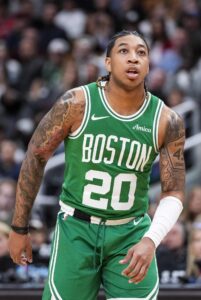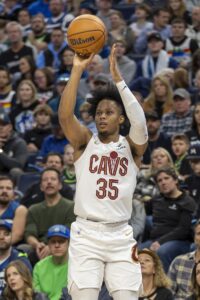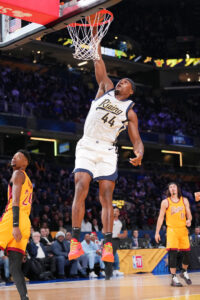Every year, several two-way contract players outperform their current deals and wind up playing more minutes than expected for their respective organizations. However, two-way players are limited to 50 games on their contracts and aren’t eligible for the postseason.
[RELATED: 2024/25 NBA Two-Way Contract Tracker]
Once top two-way players approach their 50-game limit or it’s clear they’re either a part of the organization’s future or making an immediate impact, a team will often convert their deals. Some teams have to wait longer than others due to financial reasons or a lack of roster spots, however.
Take the Heat, for example, who often begin seasons with 14 players on standard deals as opposed to the maximum allowable 15 due to their position against the tax. That’s what they did in 2021/22 when they had Caleb Martin on a two-way deal before signing him at mid-season, when his salary would be prorated and allow them to squeeze under the tax line.
Still, we’re almost certain to see several players converted from two-way to standard contracts this season. Last year, Vince Williams, GG Jackson, Keon Ellis, Craig Porter Jr. and Duop Reath were among impact players who were converted sooner rather than later. Martin, Aaron Wiggins and Sam Hauser are other good in-season examples for recent years.
The Heat could repeat history with a two-way player who may see minutes relatively early in the season with Keshad Johnson. Miami signed Johnson to a two-way deal right after the draft and he played well for the team this summer after ranking as one of the best undrafted free agents. With Martin gone, minutes are open along the wing and at the forward spot for the Heat and it wouldn’t be surprising to see Johnson fill in.
The Wizards have a roster glut to sort through before making any such move, but since they’re likely to be active at the trade deadline, it wouldn’t be surprising to see Justin Champagnie get brought up at some point. Champagnie has appeared in 56 NBA games and impressed in the G League.
The Kings may have one of the best trios of two-way players in the league with Mason Jones, Isaiah Crawford and Isaac Jones. The latter two players went undrafted in 2024 but were rated among the best available rookie free agents after June’s draft. Mason Jones, meanwhile, has impressed in the league before and posted a .502/.459/.833 shooting line in the G League last season. Sacramento could have an opportunity for minutes early with Devin Carter dealing with a shoulder injury and the team light on depth.
Cleveland has been filling out its two-way slots over the past week, bringing in JT Thor and re-signing Emoni Bates. Thor is still just 21 after having three seasons of NBA experience. Bates impressed last season in the G League, averaging 21.6 PPG and making 37.0% of his 10.5 three-point attempts per game. With the Cavaliers still having three open standard roster spots, it’s possible their rotation is a bit shallower to begin the year even if Isaac Okoro re-signs.
Utah is another team with several “veterans” on two-way deals between Jason Preston, Oscar Tshiebwe and Micah Potter. Tshiebwe, in particular, was the G League Rookie of the Year last season after pulling down 16.1 rebounds per game. The Jazz are a young team that could give minutes to as many young players as possible to see who sticks.
That brings us to our question of the day. Which player currently on a two-way contract do you see earning a promotion this season? Are there any players who you think are underlooked? Which players are primed to earn minutes right away?
Take to the comments to let us know. We look forward to your input!
 A 2022 second-round pick, Davison has played sparingly at the NBA level in his first three professional seasons and logged just 51 minutes in 12 total appearances for the Celtics in ’24/25. He spent most of his time with the Maine Celtics, appearing in a total of 45 Tip-Off Tournament and regular season games for Boston’s NBAGL affiliate.
A 2022 second-round pick, Davison has played sparingly at the NBA level in his first three professional seasons and logged just 51 minutes in 12 total appearances for the Celtics in ’24/25. He spent most of his time with the Maine Celtics, appearing in a total of 45 Tip-Off Tournament and regular season games for Boston’s NBAGL affiliate. There are still a couple teams with cap room available, so one of those teams – the Pistons and Jazz – could make life difficult for the Cavaliers by giving Okoro an offer sheet in that $12-15MM range, but there has been no indication either club plans to do so. A sign-and-trade to an over-the-cap team is another possibility, and Fedor confirmed in
There are still a couple teams with cap room available, so one of those teams – the Pistons and Jazz – could make life difficult for the Cavaliers by giving Okoro an offer sheet in that $12-15MM range, but there has been no indication either club plans to do so. A sign-and-trade to an over-the-cap team is another possibility, and Fedor confirmed in  An undrafted free agent out of Kentucky, Tshiebwe has only appeared in eight NBA games as a rookie, but had a monster season for the Indiana Mad Ants in the G League, where he began the Showcase Cup in the fall by racking up 33 points and 22 rebounds in his first ever NBAGL outing.
An undrafted free agent out of Kentucky, Tshiebwe has only appeared in eight NBA games as a rookie, but had a monster season for the Indiana Mad Ants in the G League, where he began the Showcase Cup in the fall by racking up 33 points and 22 rebounds in his first ever NBAGL outing.